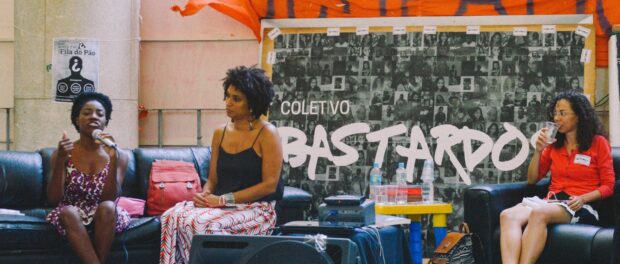
Nearly three months after the March 14 assassination of Rio City Councillor Marielle Franco, police have yet to provide a definitive answer to “Who killed Marielle?” A black, bisexual mother from a favela, Marielle represented the unrepresented. Her name reverberated worldwide after the assassination. But before Marielle’s death, and before her name was known around the world, she was already an inspiration and a support to many marginalized individuals and groups across Rio de Janeiro.
One such group is a collective of students who attend Rio de Janeiro’s prestigious, private Pontifical Catholic University (PUC-Rio), located in the exclusive South Zone neighborhood of Gávea. In 2016, Rocinha resident and community journalist Michel Silva and 15 other students founded the Coletivo Bastardos da PUC-Rio (Bastards of PUC-Rio Collective). Silva explained the collective’s name: “it’s an ironic take on the term ‘filhos da PUC’ (‘children of PUC’) which you hear a lot at the university… They, the white and middle or upper class students who live in the richest South Zone neighborhoods and pay the expensive monthly tuition fees, are the sons and daughters of PUC. We, the brown and black students, who need a scholarship to attend, we are the bastards.”
Marielle graduated with a degree in sociology from PUC-Rio and went on to complete a master’s in public administration at the Fluminense Federal University (UFF). Silva explained on Facebook how the group reached out to her for support: “In our struggle to strengthen and empower scholarship/marginalized students, we were creating a handbook to help these students resist at PUC. Marielle Franco was one of the people who helped us. Resistance has always been our struggle. Last year, Marielle wrote a letter to all of the bastard college students.”
Marielle not only wrote a letter to be included in the handbook but also attended the collective’s launch event. After Marielle’s assassination, Silva shared the letter on Facebook and it was circulated by thousands more across social media as well as being reproduced by the Piauí magazine. With the permission of Coletivo Bastardos da PUC-Rio, RioOnWatch has translated the letter into English:
“To the Bastards of PUC-Rio, with love:
Entering PUC-Rio may feel somewhat nerve-wracking: the natural insecurity in occupying a new space; people and norms as yet unknown… It is impossible not to feel a knot of fear in your belly! Especially when we hear stories of professors who assign texts and films in English without translations, when we don’t see any black students or professors in the classroom, when the [typical] students’ main demand is for cheaper parking, when we find out that PUC’s Pilotis student common area is a catwalk… and on it goes.
There’s no handbook that can address all the questions and worries that we may have, but some tips are important to help make sense of this new academic way of life, while taking into account our economic, political and social reality.
The first tip is not to let everything that is said about PUC affect you. Although important shared similarities exist, experiences are individual, and everything will depend very much on how you view the world and the challenges that you face.
I, for example, opted for a frank and regular dialogue with my professors in the face of the difficulties I experienced, whether as a young mother, a worker, or a favela resident. From the very concrete barrier of traveling from Maré to Gávea to arrive in time for my first class at 7am, to the extracurricular activities I couldn’t attend because of my work commitments or even because I didn’t have the money to pay for them.
Sharing our concrete reality with others does not make us victims, especially not when we do so with the intention of seeking possible alternative paths to the barriers we encounter. In this sense, the Community Dean is also a key partner for objective issues and opportunities within and outside the university.
It’s important to surround yourself with people, whether classmates, professors, or other university staff, who can help you make a full transition to PUC. This is unquestionably an excellent strategy for academic survival.
Moreover, seeking to understand PUC-Rio in its complexity, as a high-quality private university with academic prestige, is also to understand that in an unequal, racist, and sexist society, rare opportunities should not be underutilized. From this perspective, being a ‘bastard’ of PUC cannot be seen as anything bad. We need to claim a new political meaning: the ‘bastard’ is someone who resists inequalities. In this sense, it’s important that our personal story become the motor that drives our academic life.
Without losing sight of the identity, place, and family that make us who we are, studying at PUC-Rio is almost a political and social mission, since the learning process is a two-way street: when we transform, we also change everything and everyone around us. Our presence at PUC-Rio is, by its very nature, an act of resistance!
I wish you well on your academic, political, economic, and social journey.”


